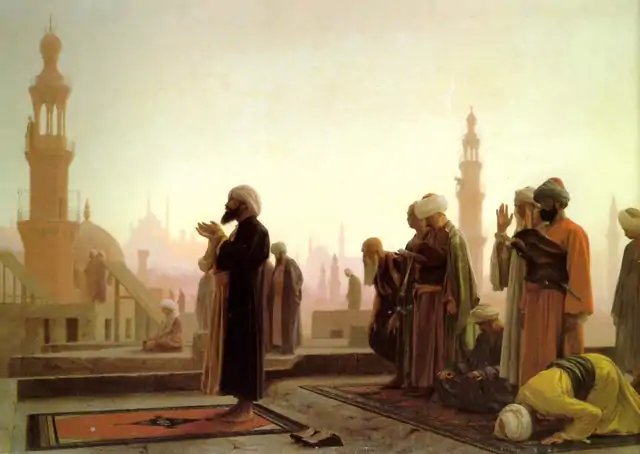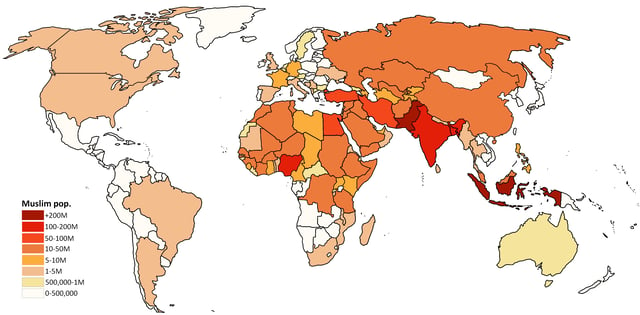Muslim

Muslim

| Total population | |
|---|---|
| 1.9 billionworldwide (2019 est.)[1][2][3] | |
| Founder | |
| Muhammad[4] | |
| Regions with significant populations | |
| Indonesia | 236,813,588[5] |
| Pakistan | 198,770,826[6] |
| India | 194,551,607[7] |
| Bangladesh | 151,905,776[8] |
| 99,186,447[9] | |
| Egypt | 94,996,415[10] |
| Iran | 82,944,372[11] |
| Turkey | 82,795,140[12] |
| Algeria | 42,070,689[13] |
| Iraq | 41,277,535[14] |
| Sudan | 39,859,930[15] |
| Ethiopia | 38,152,812[16] |
| Afghanistan | 36,798,051[17] |
| Morocco | 36,335,923[18] |
| Saudi Arabia | 32,286,039[2] |
| Uzbekistan | 30,783,683[19] |
| Yemen | 29,558,916[20] |
| China | 25,223,576[2] |
| Malaysia | 20,572,091[21] |
| Syria | 15,552,115[2] |
| Rest of the world | 340,176,009[2] |
| Religions | |
| 80–90%Sunni Islam[22][23]10–13%Shia Islam[24][25]~1%Ahmadiyya[26]~1% Other Muslim traditions, e.g.Ibadi Islam[27] | |
| Scriptures | |
| Quran[28] | |
| Languages | |
Muslims are people who follow or practice Islam, a monotheistic Abrahamic religion. Muslims consider the Quran, their holy book, to be the verbatim word of God as revealed to the Islamic prophet and messenger Muhammad. The majority of Muslims also follow the teachings and practices of Muhammad (sunnah) as recorded in traditional accounts (hadith).[31] "Muslim" is an Arabic word meaning "submitter" (to God).[32]
The beliefs of Muslims include: that God (Arabic: الله Allāh) is eternal, transcendent and absolutely one (tawhid); that God is incomparable, self-sustaining and neither begets nor was begotten; that Islam is the complete and universal version of a primordial faith that has been revealed before through many prophets including Abraham, Ishmael, Isaac, Moses, and Jesus;[33] that these previous messages and revelations have been partially changed or corrupted over time (tahrif)[34] and that the Quran is the final unaltered revelation from God (Final Testament).[35]
| Total population | |
|---|---|
| 1.9 billionworldwide (2019 est.)[1][2][3] | |
| Founder | |
| Muhammad[4] | |
| Regions with significant populations | |
| Indonesia | 236,813,588[5] |
| Pakistan | 198,770,826[6] |
| India | 194,551,607[7] |
| Bangladesh | 151,905,776[8] |
| 99,186,447[9] | |
| Egypt | 94,996,415[10] |
| Iran | 82,944,372[11] |
| Turkey | 82,795,140[12] |
| Algeria | 42,070,689[13] |
| Iraq | 41,277,535[14] |
| Sudan | 39,859,930[15] |
| Ethiopia | 38,152,812[16] |
| Afghanistan | 36,798,051[17] |
| Morocco | 36,335,923[18] |
| Saudi Arabia | 32,286,039[2] |
| Uzbekistan | 30,783,683[19] |
| Yemen | 29,558,916[20] |
| China | 25,223,576[2] |
| Malaysia | 20,572,091[21] |
| Syria | 15,552,115[2] |
| Rest of the world | 340,176,009[2] |
| Religions | |
| 80–90%Sunni Islam[22][23]10–13%Shia Islam[24][25]~1%Ahmadiyya[26]~1% Other Muslim traditions, e.g.Ibadi Islam[27] | |
| Scriptures | |
| Quran[28] | |
| Languages | |
Qualifier
To become a Muslim and to convert to Islam, it is essential to utter the Shahada, one of the Five Pillars of Islam, a declaration of faith and trust that professes that there is only one God Allah) and that Muhammad is God's messenger.[38] It is a set statement normally recited in Arabic: lā ʾilāha ʾillā-llāhu muḥammadun rasūlu-llāh (لَا إِلٰهَ إِلَّا الله مُحَمَّدٌ رَسُولُ الله) "There is no god but Allah, (and) Muhammad is the messenger of God."[39]
In Sunni Islam, the shahada has two parts: la ilaha illa'llah (there is no god but God), and Muhammadun rasul Allah (Muhammad is the messenger of God),[40] which are sometimes referred to as the first shahada and the second shahada.[41] The first statement of the shahada is also known as the tahlīl.[42]
In Shia Islam, the shahada also has a third part, a phrase concerning Ali, the first Shia Imam and the fourth Rashid caliph of Sunni Islam: وعليٌ وليُّ الله (wa ʿalīyyun walīyyu-llāh), which translates to "Ali is the wali of God".[43]
Lexicology
The word muslim (Arabic: مسلم, IPA: [ˈmʊslɪm]; English: /ˈmʌzlɪm/, /ˈmʊzlɪm/, /ˈmʊslɪm/ or moslem /ˈmɒzləm/, /ˈmɒsləm/[44]) is the active participle of the same verb of which islām is a verbal noun, based on the triliteral S-L-M "to be whole, intact".[45][46] A female adherent is a muslima (Arabic: مسلمة) (also transliterated as "Muslimah"[47] ). The plural form in Arabic is muslimūn (مسلمون) or muslimīn (مسلمين), and its feminine equivalent is muslimāt (مسلمات).
The ordinary word in English is "Muslim".
The word Mosalman (Persian: مسلمان, alternatively Mussalman) is a common equivalent for Muslim used in Central and South Asia. Until at least the mid-1960s, many English-language writers used the term Mohammedans or Mahometans.[48] Although such terms were not necessarily intended to be pejorative, Muslims argue that the terms are offensive because they allegedly imply that Muslims worship Muhammad rather than God.[49]*Mohammedanism%3A%20an%20hist]]*ther obsolete terms include [50] and.
Musulmán/Mosalmán (Persian: مسلمان) is a synonym for Muslim and is modified from Arabic. It is the origin of the Spanish word musulmán, the (dated) German Muselmann, the French word musulman, the Polish words muzułmanin and muzułmański, the Portuguese word muçulmano, the Italian word mussulmano or musulmano, the Romanian word musulman and the Greek word μουσουλμάνος (all used for a Muslim).[52] In English it was sometimes spelled Mussulman and has become archaic in usage.
Apart from Persian, Spanish, Polish, Portuguese, Italian, and Greek, the term could be found, with obvious local differences, in Armenian, Dari, Pashto, Urdu, Hindi, Bengali, Marathi, Punjabi, Turkish, Kazakh, Uzbek, Kyrgyz, Azeri, Maltese, Hungarian, Czech, Bosnian, Bulgarian, Russian, Serbian, Ukrainian, Romanian, Dutch, and Sanskrit.
Meaning
The Muslim philosopher Ibn Arabi said:
A Muslim is a person who has dedicated his worship exclusively to God...Islammeans making one's religion and faith God's alone.[[CITE|53|https://openlibrary.org/search?q=*
Other prophets
The Qur'an describes many prophets and messengers within Judaism and Christianity, and their respective followers, as Muslim: Adam, Noah, Abraham, Ishmael, Jacob, Moses, and Jesus and his apostles are all considered to be Muslims in the Qur'an. The Qur'an states that these men were Muslims because they submitted to God, preached His message and upheld His values, which included praying, charity, fasting and pilgrimage. Thus, in Surah 3:52 of the Qur'an, Jesus' disciples tell him, "We believe in God; and you be our witness that we are Muslims (wa-shahad be anna muslimūn)." In Muslim belief, before the Qur'an, God had given the Tawrat (Torah) to Moses, the Zabur (Psalms) to David and the Injil (Gospel) to Jesus, who are all considered important Muslim prophets.
Demographics

World Muslim population by percentage (2010 data from Pew Research Center)

A map of Muslim populations by absolute number, (Pew Research Center, 2009)
Sizable minorities are also found in India, China, Russia, Ethiopia, the Americas, Australia and parts of Europe. The country with the highest proportion of self-described Muslims as a proportion of its total population is Morocco.[2] Converts and immigrant communities are found in almost every part of the world.
With about 1.9 billion followers (2019), almost a quarter of earth's population,[58] Islam is the second-largest and the fastest-growing religion in the world.[59] due primarily to the young age and high fertility rate of Muslims,[60] with Muslim having a rate of (3.1) compared to the world average of (2.5). According to the same study, religious switching has no impact on Muslim population, since the number of people who embrace Islam.
A Pew Center study in 2016 found that Muslims have the highest number of adherents under the age of 15 (or 34% of the total Muslim population) of any major religion, while only 7% are aged 60+ (the smallest percentage of any major religion).
According to the same study, Muslims have the highest fertility rates (3.1) of any major religious group.[61] The study also found that Muslims (tied with Hindus) have the lowest average levels of education with an average of 5.6 years of schooling, though both groups have made the largest gains in educational attainment in recent decades among major religions.[61] About 36% of all Muslims have no formal schooling,[61] and Muslims have the lowest average levels of higher education of any major religious group, with only 8% having graduate and post-graduate degrees.[61]
Culture
Muslim culture or Islamic culture are terms used to describe the cultural practices common to Muslims and historically Islamic people.
The early forms of Muslim culture, from the Rashidun Caliphate to early Umayyad perioud, were predominantly Arab, Byzantine, Persian and Levantine. With the rapid expansion of the Islamic empires, Muslim culture has influenced and assimilated much from the Persian, Egyptian, Caucasian, Turkic, Mongol, South Asian, Malay, Somali, Berber, Indonesian, and Moro cultures.
See also
Cultural Muslim
Islamic schools and branches
Muhammadan
Lists of Muslims
Muslim holidays
Mu'min